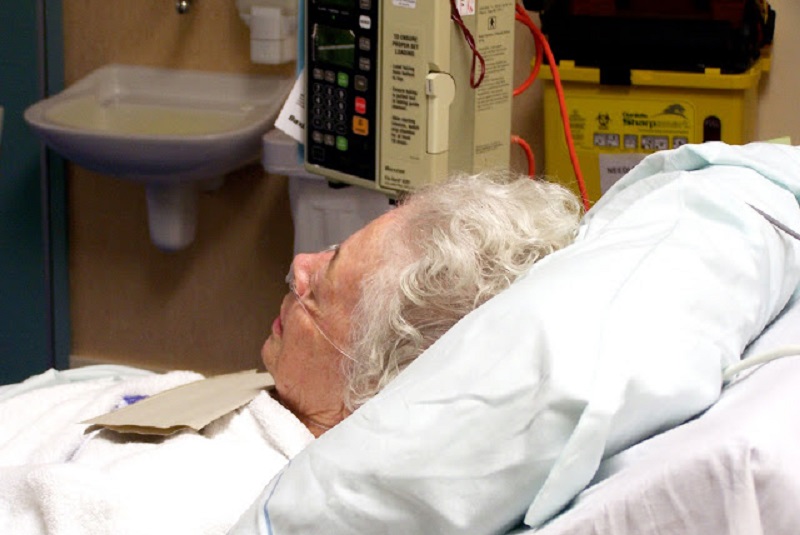We live in very nihilistic times, in which abandonment is called compassion and true compassion–the root meaning of which is to “suffer with”–is denigrated as paternalism.
Consider: Brittany Maynard became an international celebrity for killing herself. At euthanasia killings of the mentally ill, elderly, and depressed (in addition to the physically ill and disabled) in Netherlands, Belgium, and Switzerland, are mostly ignored by the media or they carry the water of assisted suicide advocates who blithedly pretend it could never happen here.
That’s why I was surprised to see a big piece in the New Yorker about the killing by a Belgian death doctor of a depressed woman named Godelieva De Troyer. She was lethally injected by an oncologist even though she didn’t have cancer.
We have seen the same thing in Oregon, death doctors assisting the suicides of patients with conditions outside of their specialty and whom they never treated.
I have written several times about how De Troyer’s son,Tom Mortier, who has been indefatigable trying to bring attention to the profound injustice of Belgium euthanasia. (Imagine receiving a telephone call from a hospital telling him to pick up your just-euthanized mother’s remains. He has even brought a lawsuit in the European Court of Human Rights.
The New Yorker article is worth reading because it shows how a country seems to have cut off its own nose to spite Catholicism’s face. From, “The Death Treatment:”
In Belgium, euthanasia is embraced as an emblem of enlightenment and progress, a sign that the country has extricated itself from its Catholic, patriarchal roots. Distelmans, who was brought up as a Catholic and then rejected the Church, told me that his work is inspired by an aversion to all forms of paternalism. “Who am I to convince patients that they have to suffer longer than they want?” he said.
That’s just another way of saying I don’t care enough about other people to relieve their suffering–which can take much effort–and protect their lives.
Click here to sign up for daily pro-life news alerts from LifeNews.com
It’s also about getting what I want no matter who else gets hurt:
The right-to-die movement has gained momentum at a time of anxiety about the graying of the population; people who are older than sixty-five represent the fastest-growing demographic in the United States, Canada, and much of Europe.
But the laws seem to be motivated less by the desires of the elderly than by the concerns of a younger generation, whose members derive comfort from the knowledge that they can control the end of their lives.
What’s love got to do with it?
The right to a dignified death is viewed as an accomplishment of secular humanism, one of seven belief systems that are officially recognized by the government. Belgian humanism, which was deeply influenced by the nineteenth-century Freemasonry movement, offered an outlet for those who felt oppressed by the Church, but it has increasingly come to resemble the kind of institution that it once defined itself against.
1981, the Belgian government has paid for “humanist counsellors,” the secular equivalent of clergy, to provide moral guidance in hospitals, prisons, and the armed forces. Humanist values are also taught in state schools, in a course called non-confessional ethics, which is taken by secular children from first through twelfth grade, while religious students pursue theological studies.
The course emphasizes autonomy, free inquiry, democracy, and an ethics based on reason and science, not on revelation. Jan Bernheim, an emeritus professor of medicine at the Free University of Brussels, who studies ethics and quality of life, told me that euthanasia is “part of a philosophy of taking control of one’s own existence and improving the objective conditions for happiness. There is an arrow of evolution that goes toward ever more reducing of suffering and maximizing of enjoyment.”
Who would have believed that humanism would become such anti-humanism for the sick, disabled, mentally ill, and elderly?
Read the whole thing. There are things in the story about which I disagree, but at least it looks at euthanasia with a clear eye.
I have been in front of audiences that have cheered the idea of the mentally ill being euthanized. They, like the Belgians, have followed the simple logic of euthanasia consciousness.
That will happen here if society widely accepts the premise that killing is an acceptable answer to human suffering.
Tom Mortier should be one of CNN’s most extraordinary people for fighting the culture of death, rather than the late Brittany Maynard for pushing it.
LifeNews.com Note: Wesley J. Smith, J.D., is a special consultant to the Center for Bioethics and Culture and a bioethics attorney who blogs at Human Exeptionalism.








